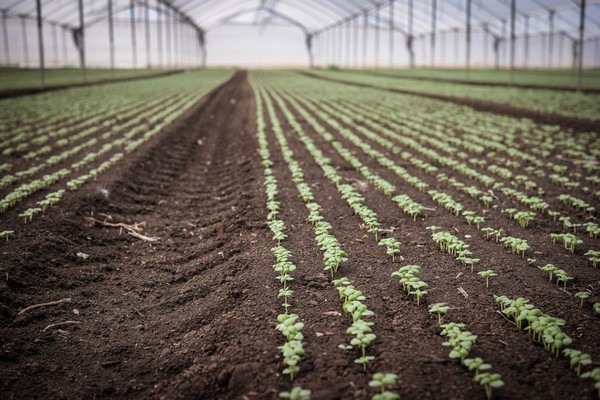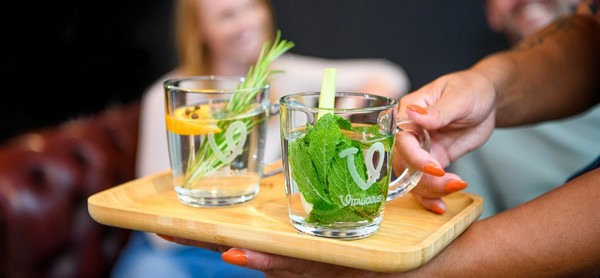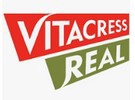 On the one hand, the Dutch company, Vitacress Real, recently had to ‘put a freeze’ on certain products. That was for specialty herbs, edible flowers, and other niche products. On the other, it saw a sharp rise in retail sales for herbs such as basil, parsley, and chives. “Along with toilet paper and canned goods, people clearly needed herbs too during the corona crisis,” says Vitacress Real’s Ralph Coenen.
On the one hand, the Dutch company, Vitacress Real, recently had to ‘put a freeze’ on certain products. That was for specialty herbs, edible flowers, and other niche products. On the other, it saw a sharp rise in retail sales for herbs such as basil, parsley, and chives. “Along with toilet paper and canned goods, people clearly needed herbs too during the corona crisis,” says Vitacress Real’s Ralph Coenen.
“Our company was on the right side of the herb market,” Ralph says, reflecting on the past few crazy months.” We sell most of our fresh herbs to the retail channel. There, we saw orders increase by about 50 to 60% in mid-March. Demand shot through the roof. But, although there was much more demand for volume, we had to reduce our capacity. That was because of the measures we had to take to safeguard the company against the virus."
"Providing enough capacity wasn't only the only challenge; getting sufficient supply was too," says Ralph. "Where were we, suddenly, supposed to get all that extra basil and chives? We didn’t have enough in the Netherlands. So we had to source from southern European countries like Italy and Spain. The coronavirus hit those countries hard, so getting volumes from there was no mean feat. We dropped everything to get enough volume and pack for the supermarkets.”

Basil
Sources
Ninety percent of Vitacress’ herbs come from Europe. “We get the remaining ten percent mainly from East Africa. For a long time now, we’ve noticed that clients want us to buy herbs from as close to the Netherlands as possible. However, you can’t compare Kenyan chives to the European variety. They’re sometimes simply of better quality."
"If there’s demand, which there always will be, then herbs from this area will always come to the European market," Ralph point out. "In recent months, growers in countries like Kenya and Ethiopia have had a hard time. That's because of the coronavirus. Air transportation schedules had gone awry. The space that was still available was much costlier too.”
Specialty herbs
In contrast, the demand for special herbs and specialties for the foodservice industry collapsed completely. “Because of the lockdown, we couldn’t get rid of them. These included Thai and red basil, verbena, and many other different kinds of special herbs. There’s no demand for these herbs in the retails sector. Consumers don’t know how to use BroccoCress in a dish or what complements it's flavor. We, therefore, bore losses here. Cultivation was also put on hold. We share this loss with the growers who grow for our programs. You can’t simply stand on the sidelines as a buyer.”
When asked whether Vitacress tried to find alternative sales channels, Coenen says it sounds like a good idea, but it’s not as simple as all that. “You often spend weeks setting up a concept and generally already have a supplier in the sales channel in mind. Developing a whole new concept takes time, which you don’t always have that when it comes to fresh herbs. That’s not to say we weren’t busy with this.
"For example, we introduced red basil pesto, and lemon thyme and mint-flavored water. However, we couldn’t do this for all the products. And even with an alternative for our red basil pesto, we still had to replow kilos of this herb. Fortunately, thanks to the increased retail sales, we didn’t suffer any revenue loss. We had decided to focus more on this sales channel and less on the special herbs”.
Stable market
Ralph saw the demand for herbs stabilize again at the beginning of July. “Over the past few weeks, we’d adjusted to this new situation in which clients didn’t quite know what to expect. We needed to find the ‘new normal’ to be able to correctly estimate when to buy. We were able to translate this into standard purchasing patterns at the beginning of July. The foodservice sector is picking up a bit again, but it remains a cause for concern. I expect there will be shifts in the assortment on that side of the market. That will be due to, for example, more focus on take-aways and orders."

The tea's from Vitacress, Vitalicious
"We, nevertheless, have confidence in this market segment. For instance, even before the coronavirus pandemic hit, we were busy setting up the Vitalicious brand. This is our own brand exclusively for the foodservice channel. It focuses on the foodservice market and has a new look and wholly new concept. From September we will start delivering our new tea line as well. We’ll also support our Vitalicious ideas on location with things like menus, serving advice, and mixes. That'll allow our partners, in this market - that we fully support - to find even more value in fresh herbs.”
Extreme weather
The herbs are currently of good quality. However, Ralph points out these products’ fragility. “For example, in June we had lots of rain. Since herbs are very sensitive to that, it caused problems. Dry weather doesn’t help either. The weather changes much faster nowadays. A week with a lot of precipitation is followed by sunny weather of 27 to 28°C. That brings a lot of challenges. I’m curious to see whether growers will be able to keep up with this in the future.”
The future
Still, Coenen is optimistic about the future. “The herb world is an orderly one, in which there are still opportunities. Consumer sales, alone, are increasing by 20 to 30% annually. In terms of health, the coronavirus outbreak could also boost sales. There’s still a growing trend in which people are seeking healthy, natural products."
"For example, lovage is a natural aromatic. And salicornia can be processed into a powder, resulting in a natural salt substitute. Food as medicine is going to play a much more significant role in the future. This is just going to develop further in the years to come,” Ralph concludes.
Voor meer informatie:
Vitacress Real
www.vitacressreal.com
Ralph Coenen
[email protected]
